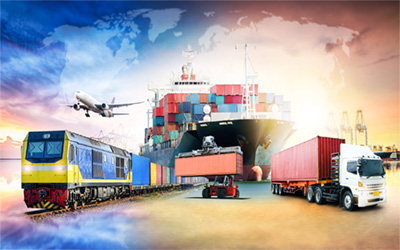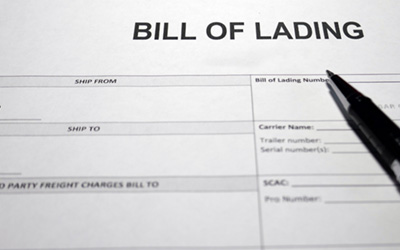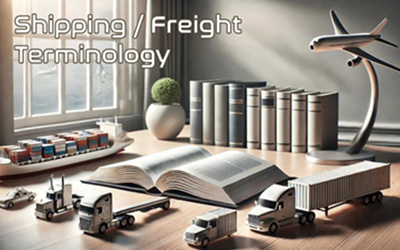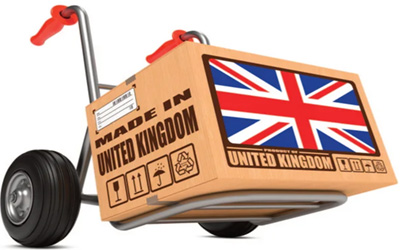A Guide to Key Freight Forwarding & Shipping Terminology
Looking to navigate the complex world of shipping and freight forwarding? This comprehensive guide breaks down the essential terminology you’ll encounter in international trade and logistics.
Understanding the Basics of Freight Forwarding
 The shipping and logistics industry operates on a foundation of specialised terms and concepts. Whether you’re new to international trade or looking to expand your knowledge, understanding shipping terminology is crucial for successful shipping operations.
The shipping and logistics industry operates on a foundation of specialised terms and concepts. Whether you’re new to international trade or looking to expand your knowledge, understanding shipping terminology is crucial for successful shipping operations.
Core Transportation Methods
Ocean freight
Ocean freight remains the backbone of international shipping, accounting for approximately 90% of global trade volume. Key terminology in ocean freight shipping include:
- FCL (Full Container Load): When a single shipper uses an entire container
- LCL (Less than Container Load): When multiple shippers share container space
- TEU (Twenty-foot Equivalent Unit): The standard measurement unit for container capacity
Air Freight
Air freight provides rapid transportation for time-sensitive or high-value cargo. Essential air freight terminology include:
- AWB (Air Waybill): The primary shipping document for air cargo
- Chargeable Weight: The weight used for billing purposes, considering both actual and volumetric weight
Documentation and Compliance
 Proper documentation is crucial in international shipping. Understanding this terminology helps ensure smooth customs clearance:
Proper documentation is crucial in international shipping. Understanding this terminology helps ensure smooth customs clearance:
- Bill of Lading (B/L): A legal document serving as proof of cargo ownership
- Commercial Invoice: Details the goods’ value and transaction terms
- Certificate of Origin: Documents where goods were manufactured
Pricing and Cost Components
Understanding shipping terminology and costs involves several key components:
Freight Rates
- Base rates for different shipping modes
- Peak season surcharges
- Special handling fees
Additional Charges
- Terminal Handling Charges (THC): Fees for loading/unloading at terminals
- Demurrage: Charges for extended container use beyond free time
- Detention: Fees for keeping containers outside the port/terminal
Insurance and Liability
Protecting cargo during transit requires understanding:
- Cargo Insurance: Coverage types and limitations
- Liability Limits: Carrier responsibilities and limitations
- Claims Procedures: Steps for filing damage or loss claims
Customs and Regulatory Compliance
Import/Export Procedures
Navigating customs requires knowledge of:
- Customs Clearance: Process and requirements
- Duties and Taxes: Calculation methods and payment procedures
- Restricted/Prohibited Items: Understanding shipping restrictions
International Trade Terminology
Incoterms
Understanding Incoterms is crucial for international shipping below is a small sample of terms used to view a full guide to incoterms visit our page on incoterms.
- EXW (Ex Works): Minimal seller obligation
- FOB (Free on Board): Seller delivers to vessel
- CIF (Cost, Insurance, and Freight): Seller arranges shipping and insurance
Technology in Freight Forwarding
Digital Tools and Platforms
Modern freight forwarding relies heavily on technology:
- Track and Trace Systems: Real-time shipment monitoring
- Electronic Documentation: Digital processing of shipping documents
- Booking Platforms: Online cargo booking systems
Conclusion
Understanding freight forwarding & shipping terminology is essential for successful international trade operations. This guide covers the fundamental shipping terminology and concepts, but the industry continues to evolve with new technologies and regulations. Staying informed about these changes and maintaining clear communication with your freight forwarding partners will help ensure smooth shipping operations.
Remember that while these shipping terminologies form the foundation of freight forwarding knowledge, each shipment may have unique requirements and considerations. Working with experienced freight forwarding professionals like SARR Logistics can help navigate complex situations and ensure compliance with all relevant regulations.
FAQ's
Q: What is the difference between a freight forwarder and a carrier?
A: A freight forwarder arranges and organises shipments, while a carrier physically transports the cargo. Freight forwarders act as intermediaries, coordinating with various carriers to provide comprehensive shipping solutions.
Q: How are shipping cost calculated?
A: Shipping costs are calculated based on multiple factors including:
- Weight and volume of cargo
- Transportation mode
- Distance and route
- Season and market conditions
- Additional services required
Q: What is the purpose of a Bill of Lading?
A: A Bill of Lading serves three main purposes:
- Receipt for goods shipped
- Contract of carriage
- Document of title to the goods
Q: What are Incoterms and why are they important?
A: Incoterms are standardised international trade terms that define:
- Responsibilities of buyers and sellers
- Cost allocation between parties
- Risk transfer points in shipping
Q: How long does customs clearance typically take?
A: Customs clearance duration varies by country and circumstances but typically takes:
- 24-48 hours for standard shipments with proper documentation
- Several days or weeks for complex cases or incomplete documentation
Q: What factors affect freight rates?
A: Key factors influencing freight rates include:
- Fuel costs
- Market demand
- Season and peak periods
- Container availability
- Route popularity
- Political and economic conditions
SARR Logistics UK
SARR Logistics UK the ultimate logistics partner for all your freight forwarding and supply chain needs. By using a professional logistics freight forwarding company you gain peace of mind that we are using the best forwarders in the business. If you would like to talk about any of the terminology used in freight forwarding please Contact us and let us guide you through your journey safely.









